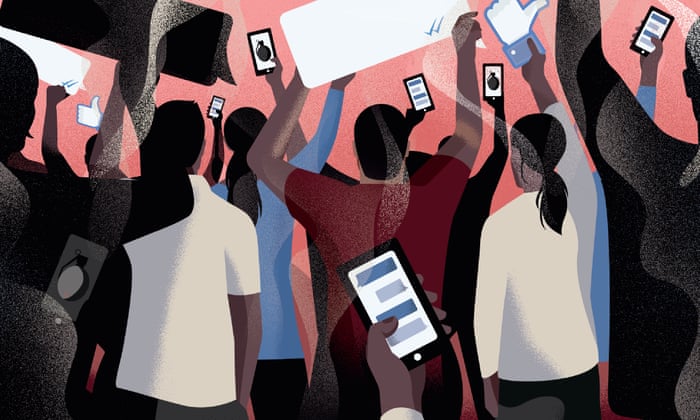- UID
- 20
- Online time
- Hours
- Posts
- Reg time
- 24-8-2017
- Last login
- 1-1-1970
|
|
━━━━━━━━━━━━━━━━━
Social media such as WhatsApp may enable voters, but encrypted messaging polarises them and blocks public scrutiny.

Illustration: Nathalie Lees
▼ In 10 days’ time, two political dramas will reach their denouement, thanks to the votes of a combined total of about 1.3 billion people. At the heart of both will be a mess of questions about democracy in the online age, and how – or even if – we can act to preserve it.
Elections to the European parliament will begin on 23 May, and offer an illuminating test of the rightwing populism that has swept across the continent. In the UK, they will mark the decisive arrival of Nigel Farage’s Brexit party, whose packed ralliesare serving noticeof a politics brimming with bile and rage, masterminded by people with plenty of campaigning nous. The same day will see the result of the Indian election, a watershed moment for the ruling Hindu nationalist prime minister, Narendra Modi, and his Bharatiya Janata party, or BJP. Whatever the outcomes, both contests will highlight something inescapable: that the politics of polarisation, anger and what political cliche calls “fake news” is going to be around for a long time to come.
In Facebook’s European headquarters in Dublin, journalists have been shown the alleged wonders of the “ war room” where staff are charged with monitoring European campaigning – in 24 languages – and somehow minimising hate speech and misinformation put around by “bad actors”. But this is as nothing compared with what is afoot in the world’s largest democracy, and a story centred on WhatsApp, the platform Mark Zuckerberg’s company acquired in 2014 for $22bn, whose messages are end-to-end encrypted and thus beyond the reach of would-be moderators. WhatsApp is thought to have more than 300 million Indian users, and though it is central to political campaigning on all sides, it is Modi and his supporters who have made the most of it. The political aspects of this blurinto incidentsof murder and violence traced to rumours spread via WhatsApp groups – last week, the Financial Times quotedone Indian political source claiming that WhatsApp was “the echo chamber of all unmitigated lies, fakes and crap in India”.
When I spoke to the UK-based Indian academic Indrajit Roy last week he acknowledged India’s “dangerous discourse” but emphasised how the online world had given a voice to people who were once outsiders. He talked about small, regional parties live-streaming rallies in “remote parts of north India”; memes that satirised “how idiotic and self-obsessed [Modi] is”; and people using the internet to loudly ask why India’s caste hierarchies held them back so much. But then came the flipside. In that context, he said, it was perhaps not surprising that Modi was now leading “an elite revolt against the kind of advances that have happened in the past five or six decades, whether it’s the rights of minorities, so-called lower castes, or women”. The fact that he and the BJP are using the most modern means of communication to do so is an irony evident in the rise of conservatives and nationalists just about everywhere.
This, then, is an Indian story, but (▪ ▪ ▪)
► Please, continue reading this article here: Source |
|